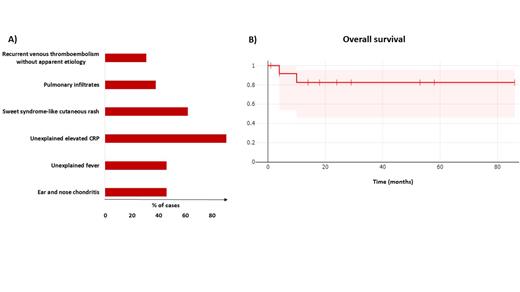VEXAS is a new entity encompassing a variety of clinical manifestations spanning from autoimmune/auto-inflammatory to hematologic conditions including MDS, plasma cell dyscrasias, and recurrent thrombosis. Somatic mutations of the X-linked UBA1 gene in hematopoietic stem and progenitor cells constitute the molecular underpinnings of VEXAS, typically occurring in men during the 6 th decade of life. Over the last 2 years since its first description, VEXAS has elicited wide medical interest resulting in the identification of pleomorphic clinical phenotypes, which make this syndrome a “big masquerader” and a clinical diagnostic challenge. Treatment strategies aim at suppression of the UBA1-mutant clone (e.g., with azacitidine or allo-HCT) or blockade of the downstream pleiotropic effects of hypercytokinemia. However, no treatment guidelines exist to date, and patients may manifest life-threatening inflammatory symptoms frequently refractory to many therapies. As few literature reports have described the successful use of transplant, we here report the outcomes of patients with VEXAS in a multicenter EBMT registry-based study.
Leveraging a multidisciplinary liaison of EBMT and key rheumatology centers across Europe, we disseminated a survey to gather further information on patients with VEXAS undergoing allo-HCT to explore overall survival (OS), transplant-specific outcomes, and reversal of the VEXAS clinical phenotype.
We evaluated a total of 13 patients, all males and with a median age of 58 years (IQR, 52-63) at the time of transplant. The majority had concomitant MDS (n=10) while 2 presented with only autoinflammatory manifestations, and 1 had MPN. In line with the genomics of the disease, UBA1 mutations consisted of missense substitutions at the Met41 hotspot in 10 cases (n=6 Thr/3 Val/1 Leu), splice site (n=2 c.118-2A>C, c.118-1G>C), and the rare p.Ser56Phe at a median VAF of 73% (IQR, 45-84). All patients presented with anemia and had concomitant rheumatologic manifestations ( Fig1A) requiring specific treatment. VEXAS symptoms preceded the diagnosis of MDS/MPN in all but one case. Cytogenetics was normal in all VEXAS/MDS cases, which also displayed lower-risk IPSS-R scores with a median bone marrow blast of 2% (IQR, 1-4).
Allo-HCT was performed at a median of 46 months (IQR, 22-59) from VEXAS onset. Before transplant, patients received a variety of both rheumatological (steroids/anti-interleukins) and hematological (azacitidine/ruxolitinib) treatments, with a high refractoriness (median number of lines 5, range 1-13). In all cases, stability of the clinical phenotype with no flares/uncontrolled manifestations was achieved at the time of the procedure. Conversely, in 3 MDS cases, clonal progression with acquisition of additional chromosomal alterations [+8, +21, t(12;16)] was evident. Overall, 62% of patients had a Karnofsky score >80% and low/intermediate (< 3) HCT-CI scores. Donor choice consisted of matched related in 23%, matched unrelated in 54%, mismatched related in 15%, and mismatched unrelated in 8% of the cohort. Peripheral blood was the preferred stem cell source in all but one case and conditioning regimen consisted of a variety of fludarabine-based strategies (n=4 MAC, n=9 RIC). GvHD prophylaxis was based on post-transplant cyclophosphamide (n=4), or serotherapy (n=8 ATG, n=1 alemtuzumab), in combination with cyclosporine and short-course methotrexate (n=5) or mycophenolate (n=4). All patients engrafted at a median time of 16 and 14 days for neutrophils and platelets, respectively. Overall, 92% of patients achieved full donor chimerism at last-follow-up. Grade II-IV acute GvHD occurred in 23% of cases, whereas only 1 patient presented with chronic extensive GvHD, which resolved 1-year after transplant. With a median time of 19 months (IQR, 8-42) from allo-HCT, 2-year OS was 82% ( Fig1B). Of note, 1 patient died because of infection and 1 because of CNS toxicity, whereas all cases with prolonged follow-up (>10 months) displayed resolution of the VEXAS clinical phenotypes and were able to discontinue immunosuppression between 2-8 months post-transplant.
Allo-HCT remains the only curative option for MDS and is used to treat rheumatologic conditions refractory to conventional treatments. We present the largest series of allografted VEXAS cases. Given the hemato-inflammatory nature of the disease, allo-HCT may be a viable option in selected patients.
Disclosures
Heiblig:Jazz Pharmaceuticals: Honoraria; AbbVie: Honoraria; Pfizer Inc.: Honoraria; Astellas: Honoraria; Servier: Honoraria. Yakoub-Agha:Kite, a Gilead Company: Honoraria, Other: travel support; Janssen: Honoraria; Novartis: Honoraria; Bristol Myers Squibb: Honoraria. Rambaldi:Abbvie: Honoraria. Scheid:Janssen: Consultancy, Honoraria, Membership on an entity's Board of Directors or advisory committees; BMS: Consultancy, Honoraria, Membership on an entity's Board of Directors or advisory committees, Research Funding; Amgen: Consultancy, Honoraria, Membership on an entity's Board of Directors or advisory committees; Abbvie: Honoraria; Takeda: Honoraria, Membership on an entity's Board of Directors or advisory committees, Research Funding; Roche: Consultancy; Novartis: Honoraria, Membership on an entity's Board of Directors or advisory committees. Voso:Novartis: Research Funding; Astellas: Speakers Bureau; Jazz: Speakers Bureau; Syros: Other: Advisory Board; Abbvie: Speakers Bureau; Novartis: Speakers Bureau; Astra Zeneca: Speakers Bureau; Celgene/BMS: Other: Advisory Board; Jazz: Other: Advisory Board; Celgene/BMS: Research Funding, Speakers Bureau. Snowden:Sanofi: Speakers Bureau; Kiadis Pharma: Membership on an entity's Board of Directors or advisory committees; advisory boards for MEDAC and Vertex, and clinical trial IDMC membership for Kiadis: Speakers Bureau; Mallinckrodt: Speakers Bureau; Jazz: Speakers Bureau; Janssen: Speakers Bureau; Advisory boards for Vertex: Speakers Bureau. McLornan:Abbvie: Honoraria; EBMT Scientific Council Member: Other: Chair of EBMT CMWP; UK ALL RIC TRIAL - DSM board: Other: participation on a data safety monitoring board or advisory board; Jazz Pharma: Honoraria; Novartis: Honoraria; Imago Biosciences: Research Funding.


This feature is available to Subscribers Only
Sign In or Create an Account Close Modal